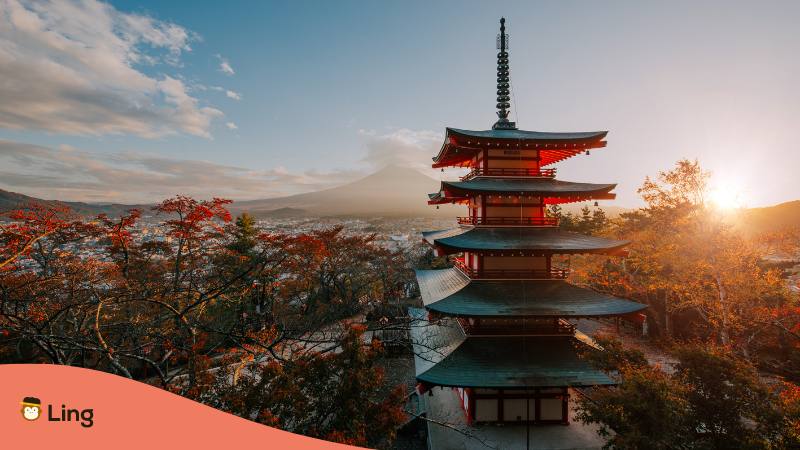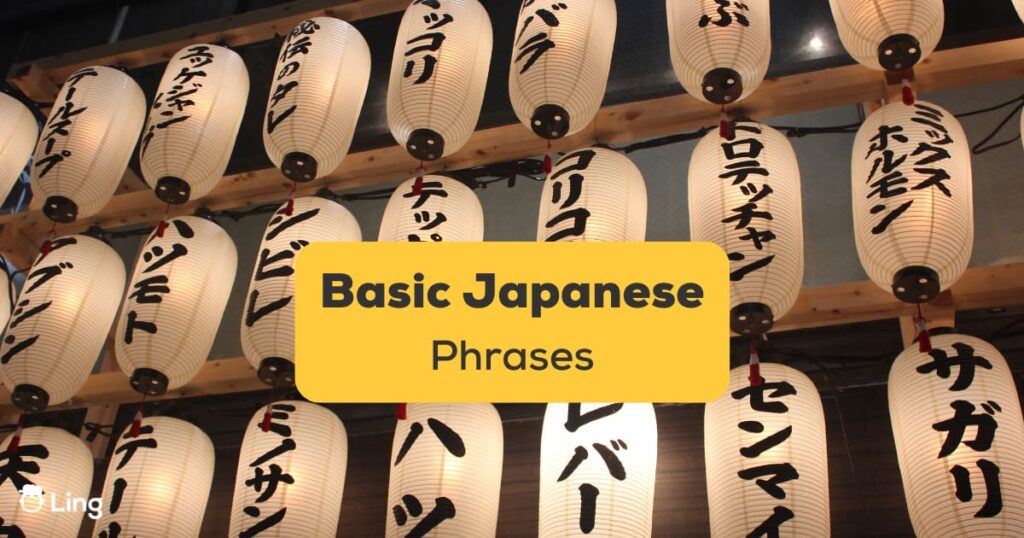Japan has always been one of the top Asian countries that foreigners want to visit at least once in their lifetime. If you plan a trip to this country, be sure to arm yourself with some basic Japanese phrases and words to connect with the locals easily.
Contrary to common belief, not everyone can speak English, so you must make it a point to remember these phrases that we will teach you today. If you are ready to learn more Japanese, then let’s take a look at the most common Japanese phrases.

What Are The 7 Most Common Japanese Phrases?
Do you have your favorite Japanese phrase? If you’re still new to Japanese and want to discover the most common Japanese phrases, here are seven to choose and memorize! Practice by yourself or with your Japanese friends to help you retain these amazing words.
1. はい (Hai) – Yes
You can use this when you agree on something or accept something. It applies to both formal and informal situations.
2. いいえ (Iie) – No
It is also applicable to formal and informal situations when you don’t agree on something or refuse something.
3. ありがとう (Arigatou) – Thanks
You can also say ありがとうございます (Arigatou gozaimasu) to be more polite and informal.
4. どういたしまして (Douitashimashite) – You’re Welcome
You can use you’re welcome in Japanese as an answer to ありがとう (Arigatou).
5. おねがいします (Onegai shimasu) – Please
You can use this phrase at the end of sentences. It adds politeness to the request you make.
6. すみません (Sumimasen) – Excuse Me
You can use this phrase before asking a stranger a question. It is formal.
7. ごめんなさい (Gomennasai) – I’m Sorry
You can use this phrase to apologize to someone in Japanese.

6 Basic Japanese Phrases For Greeting
1. こんにちは (Konnichiwa) – Hi
You can use this Japanese word to greet someone by saying ”hi,” applicable for formal and informal situations.
2. さようなら (Sayounara) – Goodbye
This is a formal way of saying ”bye” when you leave somewhere. It is informal. You can also say またね (matane) – see you to friends and family.
3. おはようございます (Ohayougozaimasu) – Good Morning
This expression can be used when you enter a crowd in the early hours of the day. If you want to sound informal and casual, you can just say おはよう(ohayou).
4. こんばんは (Konbanwa) – Good Evening
This expression can be used when you greet or say hi to someone in the evening. It is a formal expression, so it is not preferred with close ones.
5. おやすみなさい (Oyasuminasai) – Good Night
Good night is an expression before going to bed. To make it informal and casual, you can just say おやすみ (oyasumi).
6. いらっしゃいませ (Irasshaimase) – Welcome
You can hear this phrase when you enter a store in Japan. They say it with a bit of a bow to greet you. It would help if you did the same by bowing slightly.
What Basic Japanese Phrases Can You Use When Meeting Someone?
1. お元気ですか (Ogenki desu ka) – How Are You?
If you want to make an interrogative sentence in the Japanese language, you basically put か(ka) at the end of the sentence, and that’s all. You don’t need to change anything else.
2. 元気です (Genki desu) – I’m Fine
You can use this phrase to give a polite and straightforward answer to the previous question. It is applicable for both formal and informal conversations.
3. お名前はなんですか (Onamae wa nan desu ka) – What’s Your Name?
Fun fact: Did you know that formal Japanese doesn’t have a question mark for interrogative sentences? They use a full stop (。) instead. However, the question mark is commonly used in informal language.
4. わたしの名前は…です (Watashi no namae wa … desu) – My Name Is …
は (wa) does the same job as am/is/are in English. You can put your own name after this particle.
5. はじめまして (Hajimemashite) – Nice To Meet You
This expression is used when you meet with someone for the first time. It is polite and formal. After you give each other your names, you can add はじめまして (Hajimemashite).

Common Japanese Phrases For Conversations
1. 英語を話せますか (Eigo wo hanasemasu ka) – Do You Speak English?
It is always a good idea to have someone who knows English when you visit Japan; otherwise, it can be a bit overwhelming with kanji everywhere.
2. わたしは日本語が少ししか話せません (Watashi wa nihongo ga sukoshishika hanasemasen) – I Only Speak A Little Japanese.
Japanese people should know that you can’t understand most of what they are saying in order to maintain effective communication.
3. わかりません (Wakarimasen) – I Don’t Understand.
You can use this phrase to say you can’t comprehend what they have just said. This way, they can repeat the sentence slowly or say it differently for you to understand.
4. もっとゆっくり話してください (Motto yukkuri hanashite kudasai) – Can You Speak More Slowly?
I am sure you will use this sentence many times when you talk to a Japanese person since they tend to speak fast. Don’t hesitate to ask them to slow down.
5. だいじょうぶです (Daijōbu desu) – That’s All Right!
I hear this phrase in almost every anime I watch. It is a valuable phrase that can be used in many situations.
About The Japanese Language
Japanese is a systematic language with a stable foundation. It is better to start learning the Hiragana and Katakana alphabets so that you will be able to understand essential Japanese words. If you speak English, you may find spelling and sentence structure a bit challenging. But practice makes perfect, right? The best way to master it is to talk to a native Japanese speaker. Usually, there are four different writing systems in the Japanese language:
- Hiragana is used for words that have Japanese roots, grammatical elements, and suffixes.
- Katakana is used for foreign words transmitted to Japanese from a different language.
- Kanji can mean a word or idea on its own and its origin is Chinese.
- Romaji is a Roman alphabet to show the pronunciation of Japanese words.
Hiragana Alphabet
あ-A か-Ka さ-Sa た-Ta な-Na は-Ha ま-Ma や-Ya ら-Ra わ-Wa
い-I き-Ki し-Shi ち-Chi に-Ni ひ-Hi み-Mi り-Ri
う-U く-Ku す-Su つ-Tsu ぬ-Nu ふ-Fu む-Mu ゆ-Yu る-Ru
え-E け-Ke せ-Se て-Te ね-Ne へ-He め-Me れ-Re
お-O こ-Ko そ-So と-To の-No ほ-Ho も-Mo よ-Yo ろ-Ro を-Wo
Katakana Alphabet
ア-A カ-Ka サ-Sa タ-Ta ナ-Na ハ-Ha マ-Ma ヤ-Ya ラ-Ra ワ-Wa
イ-I キ-Ki シ-Shi チ-Chi ニ-Ni ヒ-Hi ミ-Mi リ-Ri
ウ-U ク-Ku ス-Su ツ-Tsu ヌ-Nu フ-Fu ム-Mu ユ-Yu ル-Ru
エ-E ケ-Ke セ-Se テ-Te ネ-Ne ヘ-He メ-Me レ-Re
オ-O コ-Ko ソ-So ト-To ノ-No ホ-Ho モ-Mo ヨ-Yo ロ-Ro
For the case of this blog post, We chose to use Hiragana and Romaji for essential Japanese words so that you can read and understand the examples easily.
Ready To Use These Japanese Phrases?
As we reach this part of the post, we hope that this list of Japanese words was useful to start learning more about the Japanese language and the easy phrases you can use anytime. Suppose this is your first time learning about this Asian language. In that case, we do understand that the alphabet, pronunciation, and even grammar patterns can be confusing.
Still, please remember that nothing can stop you from learning if you truly are motivated to learn. If you enjoyed this post and figured that you would love to know more, please check out our previous posts, like how to politely say Yes and No, and the best 5 ways to learn Japanese right away.
If you are more interested in getting to know Japanese and 60+ other foreign languages, then there’s nothing that we recommend more than using the Ling app. The Ling app is a language learning platform guaranteed to help beginners unlock the mysteries of the languages they want to learn.
The Ling app has it all for you, from fun mini-games, and comprehensive lessons to entertaining features. And the best part? You can try it out for free by downloading it from the App Store and Play Store! So, what are you waiting for? Install it now and learn the correct way with the Ling app.
Updated by CJ



































































